The Invaders, alien beings from a dying planet. Their destination: the Earth. Their purpose: to make it their world. David Vincent has seen them. For him, it began one lost night on a lonely country road, looking for a shortcut that he never found. It began with a closed deserted diner, and a man too long without sleep to continue his journey. It began with the landing of a craft from another galaxy. Now David Vincent knows that the Invaders are here, that they have taken human form. Somehow he must convince a disbelieving world that the nightmare has already begun.
Those were the words that stirred my soul back in 1967.
I was into UFOs before UFOs were cool. In fact, back in the 60s it was decidedly uncool to be into flying saucers and aliens and weird stuff in general. Now of course UFOs and UFO “hunters” are mainstream, to the point of being irritating at times.
But since I was already uncool — I liked science fiction, and monster movies, and actually read books without being forced to — I figured I might as well pursue the things I liked and to Hell with what anyone else thought. I had UFO eyewitness report forms (printed up in graphic arts class) with me at all times, just in case; I had cards (also courtesy of a graphic arts class) that identified me as being a “Researcher of Oddities, Finder of Facts” with a focus on UFOs, Cryptozoology, and “Things”. (I am particularly proud of those quotation marks.) Ivan T. Sanderson and John Keel were my heroes.
Anyway, you can see that I am no newcomer to these subjects. In a time of monster chic, I come by my monster geek honestly.
In the 1960s UFO material was hard to come by, compared to the proliferation today. Oh, there were books by “contactees,” people who said that the space people were talking with them or even taking them for rides. There were a few books collecting the most famous sightings and photographs. And there was always science fiction, which had ever been willing to embrace the idea of Invaders from Space.
But in 1967 there was precious little cultural support for someone with my tastes, particularly on television where, except for reruns of The Twilight Zone, such material was not likely to appear. (To put things in perspective, 1967 saw the premieres of The Flying Nun, The Carol Burnett Show, Mannix, and Ironside.) Star Trek was rolling, but those stories were firmly out there, not here on Earth.
Then along came The Invaders. And right from the start we knew we had something different : the throbbing spotlight on the titles, the nerve-jangling music, and there was no doubt that “they were out there” — in the first few seconds we see the alien spacecraft approaching our Earth, and are told of their plans for invasion:
Architect David Vincent witnesses a landing of an alien spacecraft, but is unable to convince anyone as to what he has seen. What seems to be proof disappears, and Vincent seems to be just another member of the lunatic fringe of “contactees”. But he knows what he saw and, determined, chases about the country following the trail of the Invaders, trying to accumulate evidence and sometimes even foiling their plans.
Unfortunately for Vincent (memorably played by Roy Thinnes), evidence is hard to come by. When the Invaders die they quickly volatilize away leaving only a greasy ash; their clothes and belongings burn away as well, and their final act is often to grasp a piece of alien technology so that it will be destroyed.
Though Vincent occasionally gets support from those who believe him or have had similar experiences, he most often pursues his campaign alone. It will come as no surprise that some of his supporters meet unpleasant ends, sometimes bringing suspicion upon Vincent as being responsible for their deaths.
(If this theme of the lone man ever alone sounds familiar, it is because producer Quinn Martin worked with Larry Cohen to develop a new property to replace Martin’s highly popular show The Fugitive, which was ending a 4-year run.)
There are only a few ways to detect Invaders inside their masquerade as humans: they are rather emotionless; physically, they have no heartbeats, their little fingers cannot bend, and if they have been too long without “regeneration” they start to show physical distress — sweating and breathing difficulties. Otherwise, their imposture is perfect.
All of this means that Vincent does not know who to trust. He quickly learns that anyone might be an Invader. Or controlled by them. Or deceived by them. Or quislings, actively supporting them in the hope of a position in the new regime. He learns that while the aliens target positions of authority — police, military, doctors, politicians, clergy, organized crime — they may also be a gas station attendant, a waitress, a bus driver… Anyone might be an Invader, which steadily raises the paranoia and provides much of the drama in each episode.
The Invaders is sometimes snap-categorized as “Cold War metaphor” or “60s Distrust of the Establishment.” But both of these, while appropriate up to a point, are overly-broad generalizations. Vincent is not a counterculture type but a clean-cut straight-up professional. He sometimes gets help from establishment figures, even inside the military, who turn to him for help in their frustration at not being believed by their superiors. The government seems to be not so much corrupt or controlled as primarily unwilling to conceive that there might be something outside of their ken.
The overall message is not a distrust of The Establishment, but of all of consensus reality. Vincent faces not only a grand plan by the aliens to dominate or extirpate humanity, he faces the challenge of believing in himself, in What He Knows To Be True, despite overwhelming lack of support.
This focus on believing in oneself despite all influences is pointed up by the show’s recurring theme of mind control being used as a tool by the Invaders. In an early episode, a duped human (Roddy McDowall) tells Vincent: “They’re not going to execute you, just change your brain patterns, impose their will on yours. That’s all.”
The X-Files memorably featured a poster in Mulder’s office that read: “I Want To Believe”, this text in conjunction with a photo of a flying disc. A poster in Vincent’s life might read “Who Can I Believe?”, with a montage of faces hovering around our hero’s.
Looked at with fresh eyes many years later, it was interesting for me to see that the alien element is largely secondary in the series. The main thrust is distrust and growing paranoia; the concept of invasion by aliens is just a convenient vehicle. I realize now that I have a selective memory of the show, with the alien bits stored in a “best of” file. I remember now that the show came on rather late for a young boy but my parents, knowing my interest, let me stay up to watch it. However, I drowsed through much of the Fugitive-style drama, waking up for the scenes of an alien spacecraft or the usage of an alien device. (The aliens had a hand weapon that worked in similar fashion to a Star Trek phaser; I constructed my own approximation of one, just as I had also made a phaser.)
Looked at critically from this remove of 40 years, I must admit that The Invaders has some problems that must be overlooked in order for the show to be appreciated. It is never really clear why the aliens do not just arrange an accident for Vincent (as they are very adept at doing for others — they have a device that mimics a natural death); the idea that Vincent’s death will “raise suspicion” becomes increasingly weak as the show goes on. While Vincent is famously an architect, he never seems to have to work — perhaps he has a trust fund that allows him to travel about on his quest. Nor does he seem to have family who worry about him, or any other associations. It is almost as if, were it not for his new career of alien-hunting, his life might be empty.
In the episode “The Innocent,” Vincent gives an Air Force officer (Dabney Coleman) the reason he is reluctant to be trotted before the “Peterson Committee” (an obvious analog of The Condon Committee, which was putting together a report on UFOs at the time):
“I’ve given up my life to fight them — my girl, my business, my plans. There’s a valley in California I once dreamt of developing… I’ve been down this road before. I’ve written, I’ve talked, I’ve phoned; I’ve seen senators, congressmen. I’ll testify. But if I do get up there, tell what I’ve seen under oath, what makes you think they’ll believe me?”
But the problem is we didn’t see any of that happening. Vincent goes straight from his sighting to being a doubted man, on the road and sometimes on the run. Several times in the earliest episodes Vincent assures someone that “You have to believe me — I know what they’re like!”, only to have that person give him information that proves that other people know more about the Invaders than he does.
Whether the show works for someone is largely a matter of taste. The slow building of tension and paranoia that involves some people, is “plodding” to others. Some find Thinnes’ acting “subtle”, others, “wooden.” Some people cannot get beyond a show about aliens with superior technology, that somehow so often devolves to fisticuffs.
But the show does seek to grow over its run. Different “models” of aliens are introduced that can more closely approximate human emotions, or properly bend their fingers. (Though the stiff-finger peculiarity was often forgotten as hands were curled into fists for the above-mentioned brawling.) There are indications that not all of the Invaders are sympathetic to the invasion, and may actually be working to help humanity.
In “The Innocent” episode mentioned above Vincent encounters a top-level alien, wonderfully played by Michael Rennie. In a fine twist on Rennie’s role as Klaatu from The Day The Earth Stood Still, the character tries to convince Vincent that the aliens are really benign, their actions misconstrued and unfortunately misguided:
“I know how you feel about us, Mr. Vincent. I don’t blame you. We’ve committed blunders, too — many of them. We’ve used terror, violence; we’ve even killed. The history of your people is full of those same blunders. What happens when one civilization finds another, less advanced? We learn, Mr. Vincent. At great cost to you, and us. Now we have our orders: it’s got to stop. We want to take the first step, Mr. Vincent — we want to show you’ve nothing to fear any more, that we’re here to help, and we want to contribute our knowledge to your lives.”
Then they take Vincent for a flight in their saucer and show him a paradise of their creation. This flight, and the message of Space Brothers offering an Eden, is directly lifted from the reports of some of the contactees of the time.
This is one of the better episodes (and not just because of Michael Rennie’s famous ability to class up any production he was involved with). Vincent has witnessed firsthand the Invaders’ “misguided” tactics; he is now shown the flip side, the promise that their technology represents. This is combined with the fact that, while their actions might be mysterious, the aliens often seem to be much more organized and purposeful than humans. Perhaps life with them wouldn’t be so bad after all…
This episode makes clear that the overriding message of The Invaders is not simply a fear of invasion or replacement, or a mistrust of authority. The message of this series is that it is correct to fear the creeping seduction of Mass Conformity, to be true to oneself and one’s own beliefs even in the face of group resistance. The aliens directly employ mind control. But humans seem to indirectly utilize a mind control as well, a powerful group mindset that Vincent must resist as he keeps pushing the envelope and upsetting the status quo.
Which raises the unsettling question: what if Vincent is wrong? What if he is just another of the contactees who got news coverage at the time as they spouted messages from Space Brothers about Universal Peace and A Golden Age — only Vincent’s message is the dark corollary. What if everything in the show is a creation of his mind, as he seeks to feel like an individual in a world that rewards conformism?
In the 50s and 60s, several ufo researchers famously died mysteriously, or of suicide. Others would go on pursuing their pursuits and claiming their claims, to be mockingly mocked. What if Vincent is another of them, just more presentable, more seemingly mainstream? Can we believe him just because of the strength of his belief, and if we do believe him, why don’t we believe those others?
All questions that add to the unease that The Invaders generates.
Is The Invaders great science fiction? No. It is not even necessarily great television. But it was an influential series with a wide range of guest stars that succeeded in developing a memorable tone, and presents a distinctive time capsule illuminating a time when our culture thought we knew what was correct but had developed reasons to doubt those assumptions.
Cheese Bits:
If you watch The Invaders on DVD, I would recommend that the first time you do so you omit the introductions featuring Roy Thinnes. It is nice to see Roy talking about the episodes, but some of the drama of each episode is provided by wondering who may or may not be an alien, and the intros unfortunately sometimes clue you in as to who the aliens are.
Due to his association with The Invaders, Roy Thinnes was asked to be an honored guest at the 2003 Roswell UFO Festival. Thinnes has attended the Festival several times since, introducing showings of episodes and doing Q&A sessions. The actor said that, while he did not originally have a strong interest in UFOs, after attending the Festival he became interested in the subject. Thinnes also sells his paintings, some of which are of the David Vincent character. Learn more about these at roythinnes.com.
Many people view The Invaders as being a precursor to The X-Files, certainly influential on the UFO zeitgeist and probably on the show itself. After hearing that in an interview X-Files creator Chris Carter had said that he would like to have Thinnes on the show, Thinnes contacted Carter and offered his services, saying that he “still had all of his limbs and most of his faculties.” After initially envisioning Thinnes in simple cameos lurking on the fringes of the action, Carter included Thinnes in three episodes as “Jeremiah Smith.”
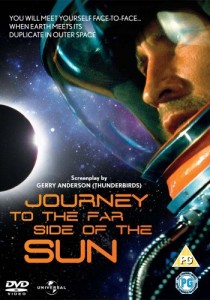 Roy Thinnes also appeared in the 1990s version of Dark Shadows as Reverend Trask; the 1973 vampire movie The Norliss Tapes; the memorable made-for-TV Horror at 37,000 Feet (1973) with Buddy Ebsen, Chuck Connors, and William Shatner; and in 1969’s Journey to the Far Side of the Sun, as an astronaut who visits a mirror-image Earth in an orbit precisely opposite our Earth.
Roy Thinnes also appeared in the 1990s version of Dark Shadows as Reverend Trask; the 1973 vampire movie The Norliss Tapes; the memorable made-for-TV Horror at 37,000 Feet (1973) with Buddy Ebsen, Chuck Connors, and William Shatner; and in 1969’s Journey to the Far Side of the Sun, as an astronaut who visits a mirror-image Earth in an orbit precisely opposite our Earth.
Public interest in The Invaders was likely helped by 1966-67 being a “flap” period, the term UFO researchers use for a spike in reports of UFO sightings. The next big flap was 1973; some researchers have tried to correlate these spikes as coinciding with a 5.5 year cycle pattern, that being half of the 11-year cycle in sunspot activity. The term flap, once used primarily for referring to the concentration of reports in time, is also used by some researchers to refer to concentrations in site-specific sightings, as in “the Phoenix flap.” Some researchers prefer the term “window.”
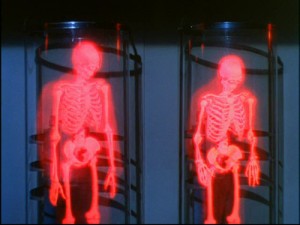 The “regeneration chambers”, tubes used to adapt the Invaders to our world, are strongly reminiscent of the pressure-adjustment tubes on the spaceship in the 1955 movie This Island Earth.
The “regeneration chambers”, tubes used to adapt the Invaders to our world, are strongly reminiscent of the pressure-adjustment tubes on the spaceship in the 1955 movie This Island Earth.
The Invaders’ spaceship is based upon the controversial photographs of famous 1950s “contactee” George Adamski, who described being taken for rides by “Space Brothers.”
Composer Dominic Frontiere, responsible for the ominous and nerve-jangling music for the series, also did the music for The Rat Patrol, The Outer Limits, and The F.B.I., as well as music for the movies Hang ’em High, Chisum, and The Stunt Man (for which he won a Golden Globe award.)
Guest stars to watch for in The Invaders:
- Roddy McDowall
- Harold Gould
- Suzanne Pleshette (as a professional stripper!)
- Jack Lord
- William Windom
- Michael Rennie
- Jack Warden
- Sally Kellerman
- Roscoe Lee Browne
- Barbara Hershey
- Diana Muldaur
- Ed Asner
- Ed Begley
- Dabney Coleman
- Norman Fell
- Joseph Campanella
- Peter Graves
- Burgess Meredith
- Ralph Bellamy
- Ann Francis
- Kevin McCarthy
- Paul Mantee
- Russell Johnson
- Gene Hackman
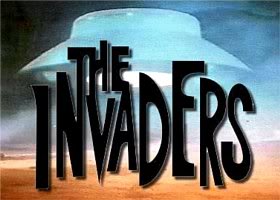
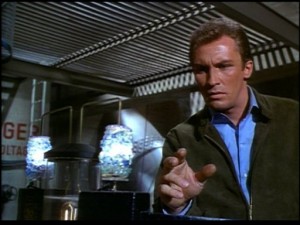
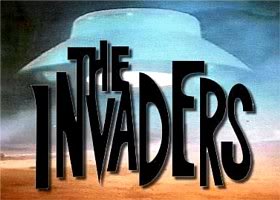
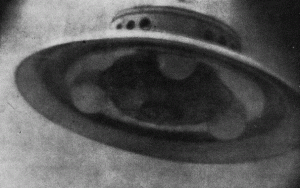
There are no comments